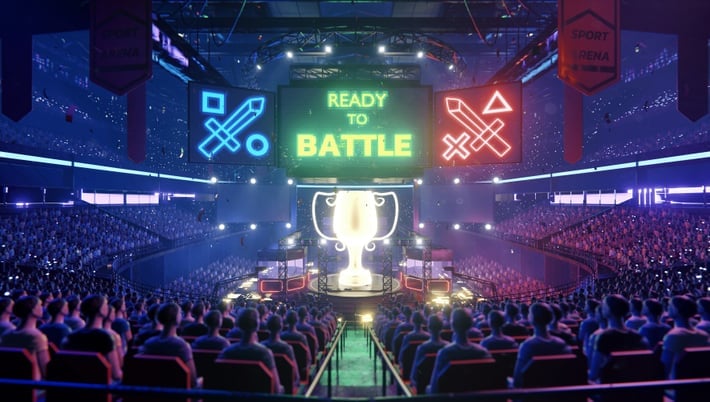eSports has come to encompass a wide range of electronic gaming experiences. They range from Vegas casino online events that are held in large convention centers with thousands of spectators to streaming tutorials, social media gaming, professional athletes bringing their traditional sports into an online forum, online video game matches and other forms of electronic gaming events. The industry is estimated to be worth $1.8 billion and is seeing a 15% year-on-year growth.
In addition to the esports athletes, the sector also has esports medical personnel, commentators, coaches, professional education programs, leagues, teams, college scholarships for esports athletes, journalists and all the trappings of traditional sports. As the pandemic subsides, the industry is looking forward to its future as a recognized sporting event.
Pandemic
When the pandemic lockdowns started, esports truly started to come into its own. Whereas teams couldn’t play live sporting events where athletes would come into close contact with each other, COVID barely caused the esports sector to hiccup.
Game events that were once played in large auditoriums moved seamlessly online, online streaming became a major source of entertainment for millions of fans and even major NBA, NASCAR and other league athletes took their rivalries to the gaming screen. The major networks such as ESPN and NBC Sports quickly adapted their programming and, while some sports fans weren’t totally satisfied, many felt that they were enjoying their fill.
It seemed as though audience numbers for esports events were appearing out of nowhere but analysts note that the fans didn’t pop up overnight. Mike Hickey, senior equity analyst at The Benchmark Co. noted that “the market was already there, it just wasn’t visible to the mainstream audience. Now that you don’t have traditional sports, you’re just surfacing what has been hiding beneath the water until now."
Enough for Everyone
Now that the pandemic seems to be subsiding, the question is whether the sports industry can sustain another sport while retaining their fanbase. Sports leagues, networks and other video game companies see the opening that will allow them to lure sports enthusiasts to esports. Not only are professional athletes embracing esports but amateurs and even sandlot players are exploring digital alternatives.
Steam, the digital distribution service powered by Valve, is setting new records for users. Once the pandemic started their usage skyrocketed 38% year-on-year from 2019. Can esports maintain the momentum? Industry insiders say yes, and note that the new sport is good for gambling which has always had strong ties to the sports world. Nevada now allows sportsbooks to take bets on esports matches and other states are following.
Adaptation
Today the question is as much one of how esports will adapt to the post-pandemic landscape as it is of how sports will adapt to esports in a post-pandemic world. eSports has already gone through sizeable shifts including reinvention of esports ecosystems and billion-dollar acquisitions.
For one thing, since gaming was one of the sole reliable sources of entertainment during the pandemic, many people already spent the money to improve their digital entertainment experience. They purchased new PC hardware, consoles and accessories meaning that, regardless of the kind of comeback that traditional sports makes, esports will be here to stay.
“All of this hardware is out there,” says Frank Azor, chief architect of gaming solutions at AMD. “There’s more high-performance and new, modern hardware in the hands of gamers right now, and in the hands of the industry, than there’s ever been.” This will give game makers an opportunity to push the limits of software. “We’re going to see richer games.”
For studios, that translates into the security of knowing that people who have invested in high-end PCs or gaming consoles will be more likely to continue to purchase the accompanying software so they will continue to produce new games and support materials.
One lesson that the esports sector learned during the pandemic is that how dependent they are on their employees. Employee illnesses and lack of child care caused game delays which meant that launch dates for new titles were pushed back and will likely continue to be pushed back in the near future.
Azor explained that there’s a cascading effect in which the delay of a single game will affect the developer’s entire pipeline. That includes expansions for that title, DLC and work on future projects. He warns that the effects of the pandemic delays will be felt for years to come. But those delays are a small price for the industry to pay in return for a larger audience.
Olympics
One sign that esports is becoming accepted in traditional sports circles is the expected introduction of esports competitions in the 2028 Olympic Games. Last year, under the auspices of the IOC, the Olympic Virtual Series was held featuring 5 esports events including virtual competitions in baseball, rowing, sailing, cycling and baseball. Other sports federations have expressed interest in future OVS installments including bodies that oversee tennis, basketball and taekwondo as well as soccer’s FIFA.
In addition, esports will make its debut at the Asian Games 2022 with medals being awarded in eight games. The IOC has said that introducing esports to the 2024 games would be “premature” is considering having an esports division in 2028, when the games will be hosted in Los Angeles.


